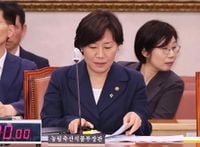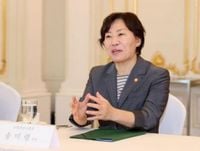In an unprecedented move that has captured the attention of South Korea's political and agricultural sectors, President Lee Jae-myung has decided to retain Song Mi-ryeong as Minister of Agriculture, Food and Rural Affairs amid a sweeping cabinet reshuffle on June 23, 2025. Song, initially appointed by former President Yoon Suk-yeol, is the only minister among 11 newly nominated candidates to be reappointed, marking the first time a minister has been retained across a change in ruling party.
Song Mi-ryeong's reappointment signals a pragmatic shift in the new administration's approach to governance. According to Kang Hoon-sik, Chief of Staff to the President, this decision reflects President Lee's philosophy of appointing officials based on performance and competence rather than political affiliation. "This appointment is based on pragmatism, free from conservative or progressive distinctions, judged by performance and competence," Kang stated, emphasizing a governance style focused on results and national unity.
Song herself expressed mixed emotions regarding the reappointment during a plenary session of the National Assembly's Agriculture, Food, Rural Affairs, Oceans and Fisheries Committee held the same day. When questioned by National Power Party lawmaker Lee Man-hee, she said, "I will do my best with a bone-breaking attitude to further develop agricultural policies from the perspective of our agriculture, rural areas, and the public, and improve the lives of our farmers." She admitted feeling "quite perplexed" but underscored a "heavier sense of responsibility than ever" given the challenging circumstances faced by the agricultural sector.
Song's retention has stirred significant controversy, particularly among opposition lawmakers and farmer groups. Democratic Party lawmaker Jeon Jong-deok vocally opposed her reappointment, citing Song's previous criticisms of key agricultural legislation. Jeon remarked, "It is unacceptable that an individual who called the four laws for agricultural livelihood 'four laws of agricultural ruin' and attended the emergency martial law cabinet meeting has been reappointed. She must be immediately withdrawn." This sentiment was echoed by the National Federation of Farmers' Associations, which condemned the decision, accusing Song of leading policies that harmed farmers and condoning the martial law incident.
Indeed, Song's record reveals a complex relationship with recent agricultural policy reforms. She had opposed the Democratic Party-led revisions to the Grain Management Act and other agriculture-related bills, labeling them as detrimental to the sector. For instance, the Grain Management Act mandates government purchase of surplus rice if prices fall, a policy Song criticized for distorting market functions, causing supply instability, and imposing heavy fiscal burdens. In November 2024, following the passage of four agricultural bills including the Grain Management Act, Song threatened to recommend a presidential veto, which was later exercised by then-acting President Han Duck-soo. She described the laws as having "clear side effects" and insisted on her duty to request the veto as the responsible minister.
The reappointment also raises questions about Song's involvement in the controversial December 3, 2024, emergency martial law cabinet meeting. Song was among 11 cabinet members present when the martial law was declared, a move that sparked nationwide protests and political turmoil. Song later claimed she was unaware the meeting was for martial law declaration and stated, "If I had known, I would not have attended." She criticized the martial law as "wrong" and problematic. Despite a police investigation and potential further inquiries, the Presidential Office concluded she had "no active involvement in the martial law/rebellion," deeming her reappointment appropriate after thorough internal verification.
Song's academic and professional credentials are formidable. Born in Nonsan, Chungcheongnam-do, she graduated from Ewha Womans University with a degree in Political Science and Diplomacy. She earned a master's degree in Environmental Planning and a doctorate in Urban and Regional Planning from Seoul National University. Her career spans over two decades at the Korea Rural Economic Institute (KREI), where she combined policy research with fieldwork, holding leadership roles such as head of the Agricultural Outlook Center and acting vice president. She also contributed to national development strategies as a private commissioner of the Presidential Committee for Balanced National Development and served as a fiscal policy advisor to the Ministry of Economy and Finance.
Officials within the Ministry of Agriculture, Food and Rural Affairs expressed surprise at the reappointment but noted that policy differences between administrations in agricultural matters are not substantial, suggesting a smooth continuation of policy implementation. A ministry official commented, "The reappointment aligns with President Lee's pragmatic philosophy and principle of appointing capable individuals, regardless of past affiliations." This perspective underscores the administration's focus on expertise and stability amid complex challenges such as agricultural market volatility, price stabilization, and food security.
President Lee's campaign emphasized revising the Grain Management Act to stabilize rice prices, improve food self-sufficiency, and enhance the food security index—goals that had been stalled under the previous government. The Ministry of Agriculture has reportedly proposed modifying the mandatory purchase clause to a conditional purchase to reduce fiscal strain, a move that may reconcile Song's earlier concerns with the new administration's objectives. On the day of her reappointment, the revised Grain Management Act was reintroduced at the National Assembly's Agriculture, Food, Rural Affairs, Oceans and Fisheries Committee plenary session, signaling renewed legislative momentum.
Song's reappointment exempts her from a National Assembly confirmation hearing, a notable procedural exception. This decision has drawn criticism from some quarters, including President Lee himself, who previously criticized Song during her 2023 confirmation hearing over allegations of an illegal gift to her son, which she explained as a living expense. At that time, Lee questioned her suitability for public office, highlighting the contentious nature of her political trajectory.
Despite the backlash, Song remains committed to advancing the new government's agricultural agenda. She pledged to "actively re-examine contentious policies and laws in line with the new government's governing philosophy" and to accelerate efforts addressing current agricultural issues and farmer livelihoods. Her blend of academic rigor, policy expertise, and practical experience positions her as a pivotal figure in navigating South Korea's agricultural future during a period marked by economic uncertainty and evolving political dynamics.
The decision to retain Song Mi-ryeong encapsulates the Lee administration's broader strategy of pragmatic governance, prioritizing competence and continuity over partisan loyalty. It also underscores the balancing act required to unify a politically divided nation while addressing pressing sectoral challenges. Whether this approach will yield the desired policy outcomes and political cohesion remains to be seen, but it undeniably marks a significant moment in South Korea's political landscape.


